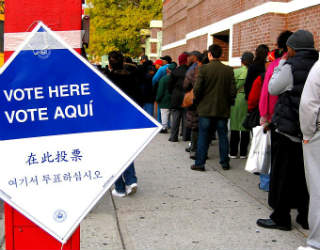
After a long and bitterly contested battle, the forces of inclusive democracy came out on top yesterday. The better angels of the American people spread their wings, as they went to the polls.
An African-American president was re-elected to the office of the Presidency, the Democrats unexpectedly strengthened their hand in the Senate and House, and victories, including big ones for marriage equality, were registered at the state level.
Moreover, the balance of forces – that is, the ground on which people fight going forward – has shifted in a progressive direction. And thanks in large measure goes to what might be the most notable development in this election – the emergence of a multi-racial, male-female, working-class-based electoral coalition that has the potential to transform America in the years and decades ahead.
The Communist Party said a year ago that the 2012 elections would be the main front of the class and democratic struggle, and subsequent events have confirmed that fact.
Indeed, we argued (and not everyone on the left agreed and probably still don’t) that defeating right wing extremism was the key to moving the whole chain of democratic struggle forward in the coming period.
Conversely, we said that a victory by right-wing extremism would set into motion a far-reaching assault on the people’s living standards, rights, and organizational capacities, the likes that we’ve never seen.
Had Romney won the Presidency and the Republicans the Congress, it would have accelerated to warp drive a capitalist class counterrevolution – a reversal of seventy years of social progress. In a matter of three months time, the entire body of social legislation dating back to the New Deal could have been expunged.
But that won’t happen due to the fact that voters – new as well as old – in their majority rejected Romney, a host of right-wing extremist candidates, their ideology, and their model of governance.
While many things went into last night’s victory, what was notable was the ability of the democratic movement to turn back Republican efforts to suppress the vote; what was history-making was the determination of the people’s movement (with labor in the lead) to reach, educate, and turn out tens of millions of American voters on election day; what was not surprising was the continuing, strategic, and sometimes underappreciated role of the African-American people (93 percent voted for the president) in the front ranks (at the head in many instances) of struggle for progress and democracy.
What was heartening was the readiness of millions of white workers and trade unionists to stand with the President even in a weak economy and in the face of unrelenting and savage racist appeals, especially in the battleground states; what was of fundamental importance was the full-throttled entry of the Latino people onto the national political stage; what was extraordinary was the turnout of the Asian and Pacific Islander people; what was encouraging was the enthusiasm with which young people again supported the president; what was no surprise was the skill with which the president contrasted his views and values from those of Romney; what was critical was the capacity of the American people to sift through the myriad of lies and deceptions that came from the Republican side.
Above all, what was decisive was the unmistakable election imprint of a rainbow working-class based electoral coalition, which has the potential to effect a process of long-term political renewal and realignment the likes of which we haven’t seen since the New Deal coalition of the 1930s.
The Republicans say that no sweeping mandate emerges out of this election, but if we think about it more deeply, we arrive at quite a different conclusion: the vote, and here I include more than a sliver of Romney supporters, is an insistent call for governmental action on the most pressing problems facing the working class and people.
This was not a vote for savaging social programs like Social Security, Medicare, and Medicaid; or rolling back domestic spending; or resolving the budget crisis on the people’s backs.
It was instead a vote for jobs, housing relief, withdrawal of our troops from Afghanistan, an end to U.S.-led wars in the Middle East, the preservation of the package of benefits and rights that the American people now enjoy, equal pay for women, health, and reproductive rights, infrastructure renewal – an issue that took on greater forces in the wake of Sandy – marriage equality, a larger commitment to public education, a tax system in which the wealthiest families and corporations pay a much larger share, reform of our punitive and anti-democratic immigration laws, a reduction in the unconscionable inequality that sets us apart from other advanced capitalist countries, and, not least, an America that stands for fairness, tolerance, and decency.
As I mentioned, the Republicans are not on board with this assessment. Too many act as if nothing has changed.
But in some ways, the bigger problem at this moment is that politicians on both sides of the aisle, major opinion makers, and the corporate elite are saying that a “Grand Bargain,” is the order of the day, beginning with spending cuts for people’s needs, a weakening of Social Security, Medicare, and Medicaid, along with some extra revenue collected in the form of a tax increase on the wealthiest Americans. Otherwise the country, the “grand bargainers” claim, will fall off a “fiscal cliff” threatening the economic recovery, global markets, and the long term viability of existing social programs.
But the conventional wisdom in this case is problematic. Many mainstream economists correctly say that the real crisis is not a fiscal one, but a jobs and growth crisis.
Once people get back to work and once economic activity picks up, they go on to argue, the nation can turn its attention to reeling in deficits without endangering economic recovery, but along very different lines than proposed by too many politicians on both sides of the aisle. On the table must be cutting military spending, ending corporate subsidies, and increasing corporate taxes.
Without catching its breath, the AFL-CIO and its allies are organizing actions against a bipartisan resolution that falls on working people. But organized labor can’t do it alone.
The coalition that mined the country for votes over the past several months and the rainbow electorate that elected the president and defended democracy yesterday must spring back into action. Tens of millions must be mobilized. Diverse forms of struggle must be employed. Not everyone has to be an Obama voter. The fight to get the anti-austerity message heard above the din of the major media is a real challenge. But it can be done.
Whatever the outcome of this immediate battle, the struggle to put the people’s needs and nature before corporate profits and war spending will be a long one. This still- emerging multi-racial, working-class based coalition will experience victories, like we did on Election Day. But it will also encounter defeats. The main thing is that it never lose sight of the necessity of deepening and extending its reach, unity, and multi-racial, class-based character.
The task isn’t to replicate the movements of the 1930s and 1960s, but today’s activists would do well to draw the lessons from those movements and adapt them to current conditions.
Both have much to teach, but given the concentrated corporate economic and political power that the American people are up against, today’s movement has to eclipse them in terms of scope, depth, and class and anti-racist understanding and unity. We are at the dawn of a new era.
PHOTO: April Sikorski, Creative Commons Attribution-Share Alike 2.0 Generic license.


 Join Now
Join Now